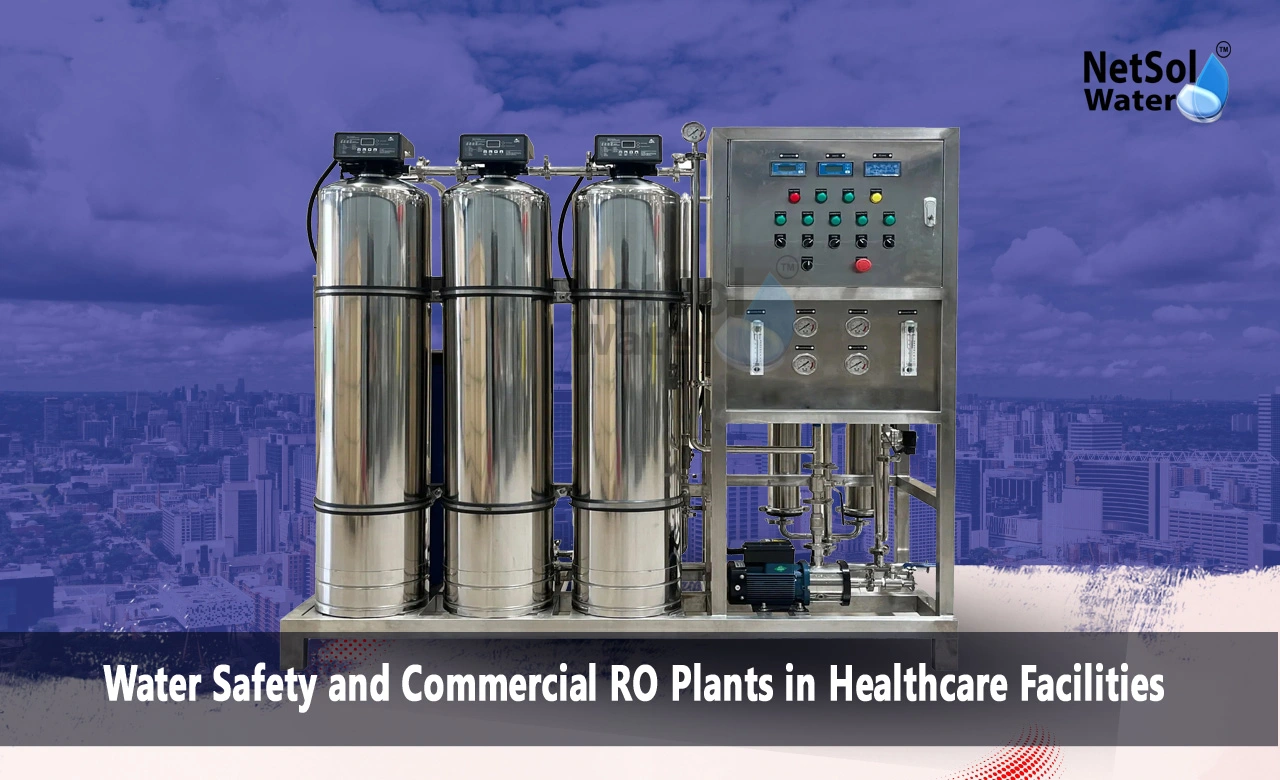Water Safety and Commercial RO Plants in Healthcare Facilities
Clean water powers healthcare facilities. From sterilising equipment to quenching patient thirst, a reliable pure water supply matters immensely. Commercial RO plants have become the top choice for ensuring water safety in hospitals, clinics and other medical settings. We'll explore why water safety matters so much in healthcare and how commercial RO plants are transforming water purification in these critical institutions.
The Basics of Water Safety in Healthcare
Water safety is crucial in healthcare environments. Hospitals and medical facilities use water for many purposes:
- Hydrating and feeding patients
- Preparing medications
- Performing surgeries
- Sterilizing equipment
- Treating dialysis patients
- Washing laundry and cleaning
- Running HVAC systems
Waterborne pathogens threaten patients with weak immune systems. Even tiny amounts of chemical contaminants can mess up sensitive medical tests or treatments. The risks are too great on water quality.
Common Water Contaminants in Healthcare Settings
Healthcare facilities face many potential water contaminants:
Microbiological Threats
Bacteria, viruses and other microorganisms can grow in water systems. Legionella bacteria which cause a nasty form of pneumoniaworry hospitals most.
Chemical Contaminants
Leftover drugs, heavy metals and disinfection byproducts can sneak into water sources. These endanger patients and can interfere with medical equipment.
Mineral Buildup
Hard water minerals like calcium and magnesium can build up in pipes and equipment. This reduces efficiency and gives bacteria a place to grow.
Particulate Matter
Sediment and other particles can clog filters and mess up medical devices that need clean water.
The Challenge of Water Purification in Healthcare
Purifying water for healthcare use is tough. The water must be extremely pure but also produced in large amounts. Old filtration methods often fall short in one or both areas. Chlorine kills many germs but doesn't remove chemicals and can create harmful byproducts. Ultraviolet (UV) light treatment removes microorganisms but doesn't touch dissolved solids or chemicals.
Commercial RO Plants
Commercial RO plants offer a complete solution that tackles all water quality issues. Here's how RO works and why it works so well:
The RO Process
1. Pretreatment: Water flows through sediment and carbon filters to remove bigger particles and some chemicals.
2. Pressurization: The system pressurizes the water and pushes it against a special membrane.
3. Separation: The membrane lets water molecules pass through but blocks larger molecules, including dissolved salts, organics and microorganisms.
4. Post-treatment: The clean water might get extra treatments like UV disinfection or remineralization depending on how it will be used.
Advantages of Commercial RO Plants in Healthcare
Comprehensive Purification
RO removes up to 99% of dissolved solids, organic compounds and microorganisms. This level of purification is essential for sensitive medical uses.
Scalability
Commercial RO plants can produce huge amounts of purified water to meet the needs of even the biggest hospitals.
Consistency
RO plants provide reliable high-quality water no matter how the source water quality changes.
Cost-Effectiveness
The initial cost might be high, but RO plants usually have lower running costs than other purification methods over time.
Reduced Chemical Usage
RO cuts down on chemical treatments, which helps the environment and sensitive medical applications.
Implementing Commercial RO Plants in Healthcare Facilities
Installing a commercial RO plant in a healthcare facility takes careful planning and know-how. Here are some key things to think about:
System Design
The RO plant must be the right size to meet the facility's water needs. You have to consider peak usage, storage capacity and backup systems.
Integration with Existing Infrastructure
The RO plant must fit smoothly into the facility's current water distribution system. This might require upgrading pipes or storage tanks.
Compliance with Regulations
Healthcare facilities must follow strict water quality rules. The RO plant should meet or exceed all relevant regulations.
Maintenance and Monitoring
Regular upkeep is crucial to keep the RO plant running well. Automated monitoring systems can catch problems early and keep water quality high.
Staff Training
Running and maintaining the RO plant requires special knowledge. Staff should get thorough training on how to operate and troubleshoot the system.
Conclusion
Water safety is non-negotiable in healthcare delivery. Commercial RO plants offer a powerful solution to the complex problem of providing consistently pure water in medical settings. By removing many contaminants and producing large amounts of high-quality water, RO technology helps healthcare facilities protect patient health, improve treatment outcomes and operate more efficiently.
To explore customised commercial RO plants, Industrial RO plants, ETP or STP solutions for your needs in your areas and nearby regions, contact Netsol Water at:
Phone: +91-965-060-8473, Email: enquiry@netsolwater.com



